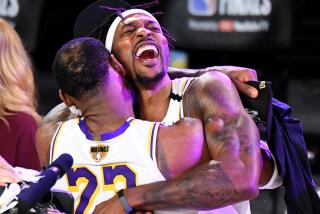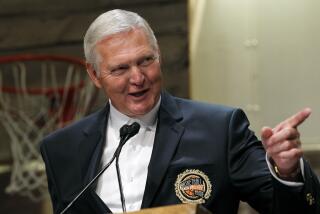Laker Legend West Leaves to Take Over in Memphis
Jerry West stood beside an idling jet early Tuesday morning, about to leave Los Angeles and the Lakers for a new town and a new team, and for the kind of fight that for the moment does not exist here, where championship banners fly.
Only hours before, his decision to become President of the NBA’s Memphis Grizzlies brought his first uninterrupted sleep in weeks. But, before he would board, a final chance to turn back rolled over the LAX tarmac.
The black Mercedes pulled close, the passenger side door opened, and his friend, protege and successor as Laker general manager smiled from behind the wheel and leaned across the console.
“Get in,” West was told.
He grinned and refused.
Soon they stood together in the morning chill, West, the man who maintained a championship era in the 1980’s and built another in the 1990’s, alongside Mitch Kupchak, the man charged with maintaining a West creation that has won the last two NBA titles and is favored to win again this year.
They spoke for a while, and they hugged, and they cried some. And then the unimaginable happened. Jerry West, an icon of Los Angeles sports, whose dashing image soothed Laker fans long before it became the NBA logo, left.
Forty two years after first joining the team, he was a Laker no more. The man who personified Laker pride in an era of Boston Celtic dominance, the man who choreographed Showtime and engineered the deals that brought in team cornerstones Shaquille O’Neal and Kobe Bryant in the glorious Summer of ‘96, was off to a new place, a new challenge.
“He wouldn’t get in,” Kupchak reported with a shrug. “He got on the plane.”
By early afternoon, West, tanned and hale and ready to go to work again, steadied himself before a microphone in Memphis, Tenn.
“After this one year, it has been very challenging for me to find enough things to do in my life,” West said.
“I’d like to think I’m still capable of working hard and doing something that will really whet my appetite. More importantly, there are a lot of things that need to be done here.”
Months of negotiations had led him from semi-retirement to the controls of a franchise that won only 23 games this season. At 63, West’s new career means reshaping an organization that in seven years has failed to produce a winner. More, perhaps, it means leaving behind four decades of basketball, of friendships, of a home in Bel Air and a regular game in the card room at Bel Air Country Club.
“I’ll never break my tie with the Lakers,” West said, who said he will buy a home in Memphis but not sell in L.A. “It’s probably the most important thing of my professional life ... I talked with [Laker owner] Dr. Jerry Buss at length one day, and I gave [former UCLA Coach] John Wooden a call, two people I admire greatly. They were really helpful, I think, in getting me to the point to consider maybe I should be doing something else with my life. It was a difficult decision.
“This is a huge step in my life. But, when I looked at it, the opportunity available here, and working with an owner who will be very similar to Jerry Buss in terms of wanting the best, I thought it was a great opportunity to help someone build a franchise.
“For competitive people,” he added, “that’s what drives them. You need reasons to get up every day and go to work.”
He arrived in Los Angeles in 1960, a shooting guard from West Virginia chosen in the NBA draft by a franchise only recently relocated from Minneapolis. He averaged 27 points in 13 seasons, finally winning an NBA title in his 12th. Along the way, he became known as “Mr. Clutch” for his late-game and playoff scoring.
As a Hall-of-Fame player and then as a consultant and team executive, West helped the Lakers win eight NBA titles. He retired as a player in 1974, then coached the Lakers for three seasons, starting in 1976. He was a special consultant to General Manager Bill Sharman for the next three seasons, and then replaced Sharman.
West ran the Lakers’ basketball operations until August 2000. Four summers before, West had signed O’Neal as a free agent, traded for Bryant and drafted an unheralded guard named Derek Fisher. The Lakers picked up Robert Horry in a trade the next season, and signed Rick Fox as a free agent the following summer, completing the core of the reigning champions.
But finally, when the reward came, West, ravaged by the stress of his position, could barely watch the team in the playoffs. During the game that clinched the NBA title against the Indiana Pacers, West was driving the freeways of Los Angeles, getting updates from the radio. Unable to enjoy the club’s first championship in 12 years, he retired two months later.
After a year almost completely removed from the game, West gradually returned, primarily as a consultant to Kupchak. By the second half of this season, he was a regular at home games again, and acquaintances began to suggest he was preparing himself for a second career.
“We had a long talk not too long ago,” Wooden said. “He was restless and said he missed it. One of his big problems was that he didn’t want to seem disloyal to the Lakers.”
Indeed, by all accounts West is in the mood for basketball again.”Three or four years ago, when the rebuilding was completed, he began to lose a little bit of interest,” Kupchak said. “Maybe that’s a part of the challenge of rebuilding. When Shaquille was done and Kobe was brought on board, the coaching changes, Rick Fox being signed to a long-term deal, I got a sense that this was what he had been wanting to do for the last 10 years, to take a team that had kind of bottomed out and rebuild.”
West said in his first year off he didn’t realize how badly he need the time away.
“I think you work yourself into a position in this league where it’s not about what you do for the team, it’s almost like your family becomes second place,” West said. “That’s not very good. I think that the enormous pressure and stress that’s there in Los Angeles to win games, and more importantly win championships, that’s been created
That’s Kupchak’s duty now, and Buss’. In the meantime, West healed, and came to dote on Kupchak and the Lakers as part of his $1 million a year consulting job. When word spread that he would consider manning another team, several owners called, including the Grizzlies’ Michael Heisley. When West determined the job was attractive and the project was viable, he eagerly returned.
He was reportedly given a stake in the Grizzlies’ franchise along with a multi-year contract that will reportedly pay him $5 million annually, but his acceptance had little to do with the money.
“Everybody has their own rhythm and cadence in life,” said Kareem Abdul-Jabbar, the Laker center from 1975-89. “If he wants to do this, he must be really motivated.”
Chick Hearn, the Laker broadcaster who called nearly every game West played and for 25 years after West retired, spoke to West on Monday.
“It got pretty emotional,” he said. “We both cried. There are just so many memories ... Jerry feels he’s making the right move, and I think he’ll do well.”
Los Angeles Mayor James Hahn, a fan of West’s for four decades, said he will always consider West a Laker, regardless of the uniform he represents.
“I can’t believe he’s leaving,” Hahn said, “but I guess life moves on.”
Four hours after West’s chartered jet left Los Angeles, a thunderstorm heaved over Memphis, and there was concern that West’s chartered plane would not be allowed to land. The storm broke long enough, however, and the West party arrived in time.
At a downtown hotel, Shane Battier, a swingman who will be one of West’s better players, waited on the steps, and stuck out his hand to welcome the new man. West’s 13-year-old son, Jonnie, happened to have worn a Battier jersey to the affair.
By then, the very difficult parts had passed. West was back in the South, closer to his boyhood home in West Virginia, and he had an organization that not only needed him, but he needed as well.
An observer of the day’s press conferences and numerous other affairs said, “You would have thought the president was being inaugurated.”
West said hello a thousand times and shook at least that many hands, while a city watched and said good-bye.
More to Read
All things Lakers, all the time.
Get all the Lakers news you need in Dan Woike's weekly newsletter.
You may occasionally receive promotional content from the Los Angeles Times.






